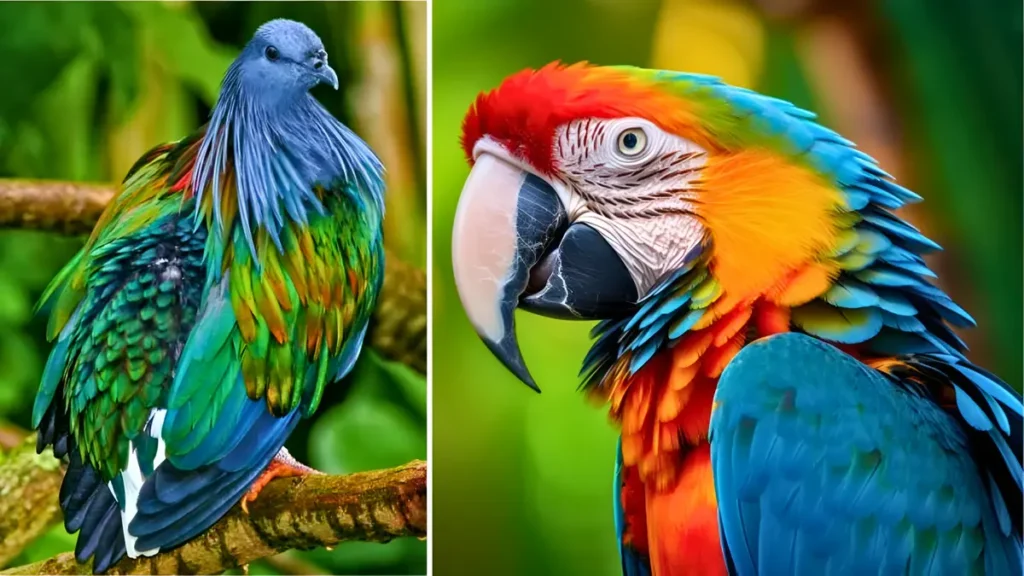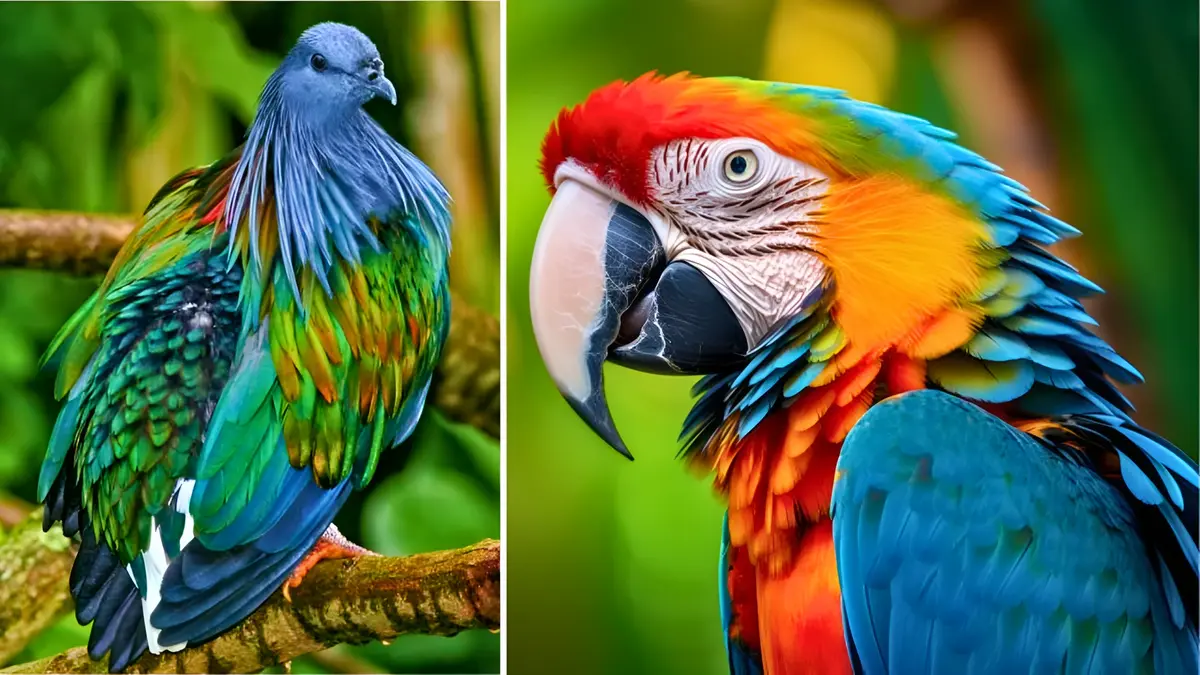Choosing the right pet bird can be a challenge, especially when it comes down to two very different but equally fascinating options parrots and pigeons. Both species have been companions to humans for centuries, but they differ significantly in temperament, care needs, intelligence, and interaction levels. This comparison will help you understand which bird suits your home and lifestyle best.

Appearance and Physical Traits
Parrots are known for their vibrant feathers and striking colors. Depending on the species, they can be small like a budgie or large like a macaw. Their curved beaks and expressive eyes add to their charismatic appearance. Pigeons, on the other hand, have a more muted color palette, often gray, white, or brown. Though not as flashy, pigeons possess a soft, rounded look and have an elegant way of moving, which many find calming and attractive.
Intelligence and Learning Ability
Parrots are among the most intelligent birds in the world. They can mimic human speech, learn tricks, and even solve simple puzzles. Their cognitive abilities are similar to those of a young child. This intelligence, however, comes with high mental stimulation needs. If a parrot is not kept mentally engaged, it can become bored, aggressive, or depressed. Pigeons are also smart, though in a quieter way. They can recognize human faces, navigate over long distances, and even learn simple tasks. They may not talk, but their calm nature and loyalty show a different kind of intelligence.
Personality and Daily Behavior
Parrots are energetic, curious, and social. They enjoy being part of family activities and often demand attention from their owners. A parrot will want to interact with you regularly and may become noisy if ignored. Their personalities can be entertaining but also intense. Pigeons are generally more peaceful. They enjoy company but are content with gentle affection and routine. They rarely make loud noises, which makes them ideal for quiet homes or apartment living. Their predictable behavior and calm presence can be a soothing addition to your household.
Space and Cage Needs
Parrots need large cages with plenty of toys, perches, and room to fly or climb. Some larger species may even require a dedicated bird room. In addition to cage space, parrots benefit from time outside the cage to exercise and interact. Pigeons, by contrast, can live comfortably in smaller spaces, although they also enjoy open areas to fly if available. A clean loft or large cage with daily flying time is enough for their needs. Pigeons don’t usually chew on furniture or wires, which makes them less destructive indoors.
Diet and Feeding Habits
Parrots need a balanced diet consisting of pellets, fresh fruits, vegetables, seeds, and occasional treats. Their diet can be complicated and requires consistency and variety. Pigeons have simpler dietary needs. A mix of grains, seeds, and access to clean water will keep them healthy. They do not require as much fresh food preparation as parrots, making them easier to feed daily.
Maintenance and Cleanliness
Parrots can be messy. They often drop food, chew toys into dust, and scatter feathers or seed hulls. Their cages require frequent cleaning, sometimes daily, to keep odors and debris under control. Pigeons are neater overall. They tend to defecate in the same area, which makes cleaning easier. Their cages or lofts can be managed with a regular routine and don’t require as much deep cleaning as parrot enclosures.
Interaction and Bonding Time
Parrots form strong bonds with their owners. Some even develop preferences for specific people and show affection through nuzzling or talking. However, these birds can also become jealous or territorial. Regular interaction is a must. If left alone too long, they can suffer from stress or behavioral issues. Pigeons bond as well, though more gently. They often return affection through cooing and gentle following behavior. They are fine with minimal daily interaction and rarely show signs of emotional distress when left alone for a few hours.
Training and Social Skills
Parrots thrive on training. They can learn to talk, perform tricks, and even respond to commands. Training sessions help build a strong bond and provide needed mental stimulation. However, training requires patience and consistency. Pigeons can also be trained, especially homing pigeons, who are known for their navigation skills. While they won’t perform tricks like parrots, they can learn to come when called or follow simple routines.
Lifespan and Long-Term Care
Parrots live long lives. Smaller species may live 15–30 years, while larger ones can live over 50 years. Owning a parrot is a long-term commitment that often outlasts a dog or cat. Their care needs evolve over time and require ongoing attention. Pigeons have a shorter lifespan, generally around 10–15 years. They still require commitment, but the time span is more manageable for many families or individuals.
Cost and Financial Burden
Parrots are expensive to buy and maintain. A healthy bird can cost hundreds to thousands of dollars. Their food, toys, vet care, and accessories add up quickly. Pigeons are more affordable, both in purchase and maintenance. Their dietary needs are less costly, and they generally have fewer health problems, especially if kept in a clean, stress-free environment.
Noise and Vocal Behavior
Parrots can be loud, especially species like macaws or cockatoos. Their calls can disturb neighbors or other household members. Even smaller parrots like conures can be surprisingly noisy. If peace and quiet are important in your home, a parrot might be challenging. Pigeons are much quieter. Their cooing is soft and rhythmic, often described as relaxing. They rarely vocalize in a way that would bother others, making them ideal for shared or small living spaces.
Health and Common Issues
Parrots are sensitive to changes in diet, environment, and routine. They can develop feather plucking habits, respiratory issues, or digestive problems. Finding an avian vet is essential for parrot owners. Pigeons are hardy birds. As long as they are kept clean and well-fed, they rarely get sick. They can still catch diseases, but their overall health is easier to manage compared to parrots.
Which Bird Fits You Best
Choosing between a parrot and a pigeon depends on your lifestyle, available time, and personal preference. If you want a colorful, talkative, and interactive bird and are ready to invest in long-term care, a parrot might be the right choice. However, if you prefer a peaceful, low-maintenance companion that brings quiet joy, a pigeon could be the perfect fit.
Disclaimer
The information provided in this article is for general informational purposes only and does not constitute professional advice. Individual bird care needs may vary depending on species, health, and environment. Please consult with a qualified avian veterinarian or bird care specialist before making decisions about adopting or caring for any pet bird.
